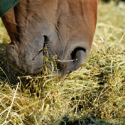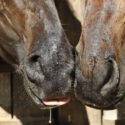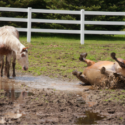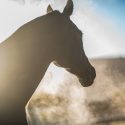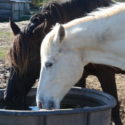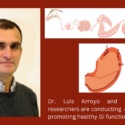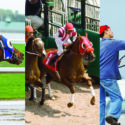Horse care
Balancing Act of Equine Nutrition
New Ration Balancer Info-sheet, Forage and the Importance of Analysis With the cost of feeding horses continuing to rise, horse owners need to become savvy when it comes to feeding their herd on a budget without compromising equine nutrition. A greater understanding of forage, the largest component of the equine diet, really improves the bottom…
Horse Portal Extends Free Offer to Youth
Start Early with Sickness Prevention! Learning healthy habits early makes biosecurity second nature and that is why Equine Guelph is offering their Sickness Prevention in Horses short online course on TheHorsePortal.ca FREE to teenagers (14 – 17). The March 18 – 29 offering of this course will be open to the grass roots of the…
Your Vaccination Program may be Impacted by Climate Change
Learn more during Equine Guelph’s Vaccination Education Month in March Have you noticed bug season starting earlier and finishing later? Have changes in the weather caused more standing water in your paddocks? If you answered yes to these questions and wonder how climate change may impact your horses, not to mention your vaccination program, read…
EquiMania! and TheHorsePortal.ca have Resources For Ag Safety Week
March 10 – 16, 2024 is Canadian Agricultural Safety Week (CASW) – an annual campaign held the third week of March of each year. EquiMania! supports the campaign for #FarmSafetyEveryday with many free games and resources to keep youth safe on horse farms and until the end of March TheHorsePortal.ca is offering a free online…
Equine Guelph Offers Body Condition Course on World Horse Day
Free Global Registration for One Day Only! World Horse Day has been celebrated on March 1st every year since it was created in 2005 to raise awareness of equine welfare and protection. As a culmination of Equine Guelph’s 20th anniversary celebrations, the organization will be offering its new online course, Introduction to Body Condition Scoring,…
Racehorse Respiratory Health Course Completes the Trifecta in Winter Online Learning Series!
Equine Guelph has partnered with Standardbred Canada, Ontario Racing and Central Ontario Standardbred Association (COSA) to offer three online courses in Winter of 2024 in priority healthcare areas of respiratory, lameness and gut health. Sponsored by Standardbred Canada, the Racehorse Respiratory Health course is the final course in this winter series. The two-week online short…
Learn How Horses Communicate in this Free Online Course for Youth
Adult offering too! Learn Together for a fun Family Day Experience! Do you love horses and want to understand them better? Do you want to learn how to read their body language, and the cues they give one another? If so, you might be interested in a free online course offered by Equine Guelph, the…
Colic Prevention Education Month 2024 Focuses on GI Health for Your Horse
February is Equine Guelph’s Colic Prevention Education Month when we tackle the number one killer of horses with our highly popular free healthcare tool, Colic Risk Rater (http://www.thehorseportal.ca/ColicTool). After you complete the free risk rater to assess your horse’s risk, you will have the option to learn more by signing up for Equine Guelph’s short…
A Stable Gut: The Key to a Healthy Equine
Equine Guelph 2024 Research Annual Volume 21 – cover story by: Jackie Bellamy-Zions Gastrointestinal issues (GI) are the number one cause of morbidity in horses other than old age. An unhealthy digestive system can cause poor performance, pain, discomfort, diarrhea, and a whole host of issues that can sideline your horse. It’s no wonder researchers…
20th Anniversary Feature with Shawna Ward
Alumni, Shawna Ward shares her passion for equine management after taking Equine Guelph’s online 12-week courses. The nutrition course in particular has reduced Shawna’s horse keeping costs. Forage based diets was a topic of great interest for Shawna. The following downloadable information sheet explains key take-aways and the benefits of feeding a forage based diet.
Go with Your Gut: Learn from the Racehorse Gut Health & Ulcer/Colic Prevention Course on TheHorsePortal.ca
For the third year in a row, Equine Guelph has partnered with Central Ontario Standardbred Association (COSA), Ontario Racing and Standardbred Canada to offer three online courses in Winter of 2024 in priority healthcare areas of lameness, respiratory and gut health. Sponsored by COSA, the Racehorse Gut Health & Ulcer/Colic Prevention course is the second…
20th Anniversary Feature with Cathy Wentworth-Stanley
Alumni, Cathy Wentworth Stanley shares her passion for learning theory and equine behaviour after taking Equine Guelph’s online 12-week courses and completing her diploma. An MSc. later, Cathy instructs Equine Guelph’s Equine Behaviour course! Of great interest was learning theory for horses. The following downloadable information sheet explains positive and negative reinforcement as well as…


